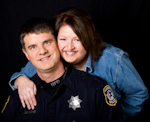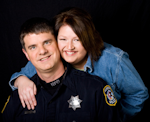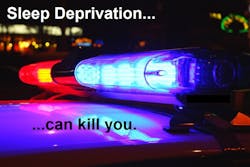The Many Ways Sleep Deprivation Can Hurt You
The need for proper and adequate sleep is hardly a mystery, nor has it really ever been. The unpleasant effects of fatigue, sleep deprivation, and even irregular sleep patterns are something almost all of us can attest to. Yet, of our basic physical needs, sleep is probably the most likely to be neglected. “I can sleep when I’m dead” is the proud mantra of those who own and wear their exhaustion like a badge of honor, with the admiration of others for such dedication and drive to power through silly thinks like rest and good health.
The thing is, “sleeping when you’re dead” just might come sooner rather than later if you are chronically sleep-deprived, either by choice or because of untreated insomnia (and if you need evidence of how widespread insomnia is, look at the prevalence sleep aids such as Ambien, Lunesta, and others). Sleep deprivation is a real, it’s serious. We live in an increasingly driven, 24 hour-a-day world, expected to fill our time with productivity, and then, at the end of the day, unending entertainment programming to fill our time into the wee hours. Kids have had this mindset drilled into them by well-meaning parents who fill their days with scheduled activity (How will little Susie ever get an Ivy without her soccer, swimming, Mandarin lessons, soup kitchen volunteerism, and competitive Traveling Team Origami?? She’s nearly 6, there’s no time to waste!), setting up a continuation of the cycle of pathological busy-ness and stress.
Even if you would resist this grind, sometimes you simply cannot, and police work offers its own challenges. Traditional shift work is hard on a lot of cops – working overnights, in particular, runs counter to our natural biorhythms and many never fully adjust their sleep to accommodate good rest – and this is especially so when shifts rotate in a way that prevents the body from settling into a pattern. Administrators and police bargaining units have largely recognized the harms of that old system of rotating shift work and departments that still adhere to them are growing rarer. Still, tradition is hard to break and, even where officers are working more stable shifts, overtime, callbacks, court appearances, family obligations, the minutia of life, and a host of other demands still challenge good rest and cut into downtime.
Regularly enjoying full sleep cycles is crucial to both physical and mental health. Sleep is restorative, during which our bodies rest and repair themselves. Most important is that which goes on in the brain. That it is during sleep the brain repairs itself and trims unneeded information from its memory banks to accommodate new learning has been established. But the effects of sleep deprivation could be even more detrimental than previously thought.
A recent study from Italy raises new alarms about what can happen when your brain is deprived of sleep. The title of the US News and World Report article (“Health Buzz: The Brain May ‘Eat Itself’ When Sleep Deprived”) reporting the study sets off alarms, and a closer look shows it’s not just hyperbole. From the article:
The consequences of sleep deprivation go far beyond needing a cup of coffee to perk you up. Consistently skimping on sleep spurs the brain to begin gobbling neurons and synaptic connections, suggests a new animal study published in the Journal of Neuroscience.
The study went as follows: Researchers led by Michele Bellesi of the Marche Polytechnic University in Italy looked at the brains of mice who could sleep as long as they pleased, who were spontaneously woken up, who were awake an extra eight hours or who were awake for five whole days (chronic deprivation). Specifically, they looked at the mice's glial cells, what New Scientist calls "the brain's housekeeping system."
One type of glial cell – an astrocyte – is meant to rid the brain of extraneous synapses, or connections, in an effort to rewire and rejuvenate it. Another, called a microglial cell, is meant to destroy "old and worn out cells via a process called phagocytosis - meaning 'to devour' in Greek," reports ScienceAlert.
While this may be a regular part of the sleeping process, both of these glial cells proved very active in the study when it came to sleep loss.
For example, sleep-deprived mice had more active astrocytes than did well-rested mice (i.e., 5.7 percent synapse activity in the well-rested brains compared to 13.5 percent in those kept awake for five days). Simply put: The brain appeared to begin eating itself…
… "We show for the first time that portions of synapses are literally eaten by astrocytes because of sleep loss," Bellesi told New Scientist.
Bellesi goes on to explain that “sustained microglial activation has been observed in Alzheimer’s and other forms of neurodegeneration."
The physically and mentally painful effects of sleep deprivation are something universally understood, as are, for most of us, the experience of pushing through when all we want to do is sleep. The obvious dangers are something we have a responsibility to know and avoid, too especially in a profession where mental alertness and sound judgment under pressure are essential for yourself and the public. But what we’re learning now highlights the dangers ever more so. Exhaustion may not only put us at risk of accidents, dangerous inattention, or missing critical details important to safety, the physical damage it does may be even worse!
Sleep is a need, and adequate sleep is one of the first needs we willingly neglect. You owe it to yourselves to make proper rest a priority. Even if you can overcome the secondary risks of sleep deprivation you may not avoid the direct effects of the damage it inflicts on the brain.

Michael Wasilewski
Althea Olson, LCSW and Mike Wasilewski, MSW have been married since 1994. Mike works full-time as a police officer for a large suburban Chicago agency while Althea is a social worker in private practice in Joliet & Naperville, IL. They have been popular contributors of Officer.com since 2007 writing on a wide range of topics to include officer wellness, relationships, mental health, morale, and ethics. Their writing led to them developing More Than A Cop, and traveling the country as trainers teaching “survival skills off the street.” They can be contacted at [email protected] and can be followed on Facebook or Twitter at More Than A Cop, or check out their website www.MoreThanACop.com.

Althea Olson
Althea Olson, LCSW and Mike Wasilewski, MSW have been married since 1994. Mike works full-time as a police officer for a large suburban Chicago agency while Althea is a social worker in private practice in Joliet & Naperville, IL. They have been popular contributors of Officer.com since 2007 writing on a wide range of topics to include officer wellness, relationships, mental health, morale, and ethics. Their writing led to them developing More Than A Cop, and traveling the country as trainers teaching “survival skills off the street.” They can be contacted at [email protected] and can be followed on Facebook or Twitter at More Than A Cop, or check out their website www.MoreThanACop.com.



